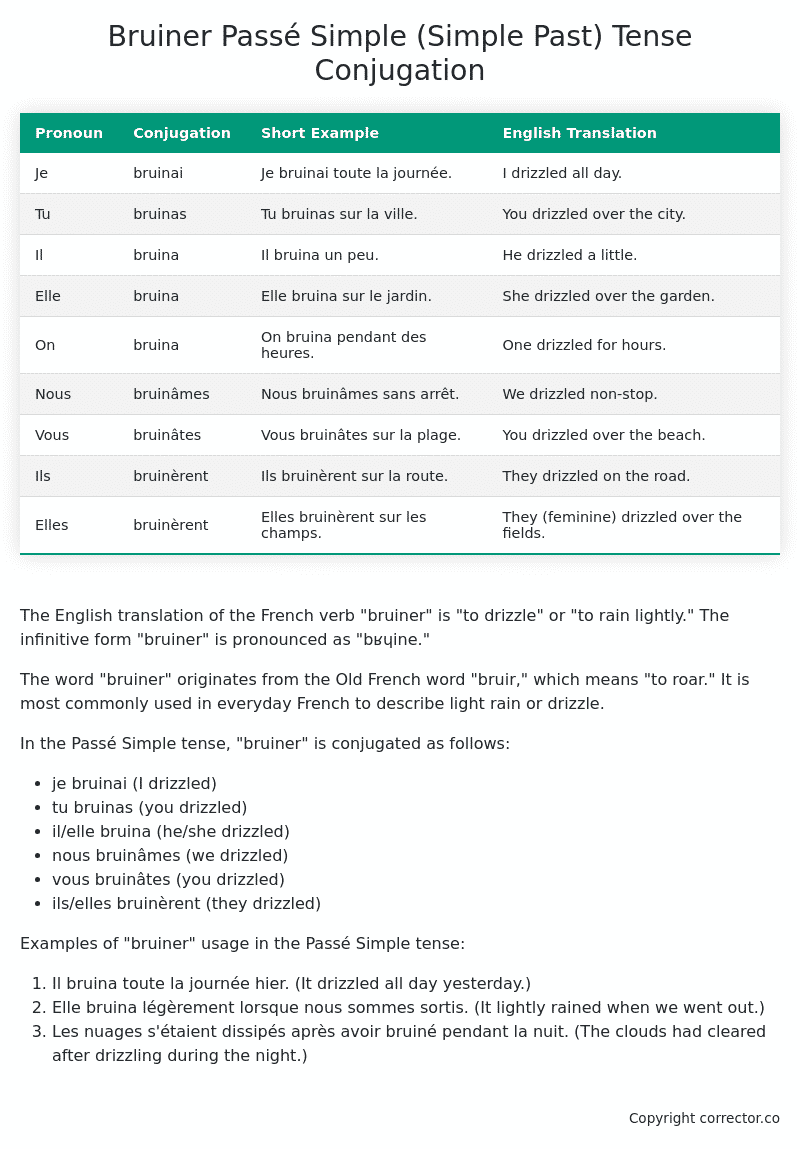Passé Simple (Simple Past) Tense Conjugation of the French Verb bruiner
Introduction to the verb bruiner
The English translation of the French verb “bruiner” is “to drizzle” or “to rain lightly.” The infinitive form “bruiner” is pronounced as “bʁɥine.”
The word “bruiner” originates from the Old French word “bruir,” which means “to roar.” It is most commonly used in everyday French to describe light rain or drizzle.
In the Passé Simple tense, “bruiner” is conjugated as follows:
- je bruinai (I drizzled)
- tu bruinas (you drizzled)
- il/elle bruina (he/she drizzled)
- nous bruinâmes (we drizzled)
- vous bruinâtes (you drizzled)
- ils/elles bruinèrent (they drizzled)
Examples of “bruiner” usage in the Passé Simple tense:
- Il bruina toute la journée hier. (It drizzled all day yesterday.)
- Elle bruina légèrement lorsque nous sommes sortis. (It lightly rained when we went out.)
- Les nuages s’étaient dissipés après avoir bruiné pendant la nuit. (The clouds had cleared after drizzling during the night.)
Table of the Passé Simple (Simple Past) Tense Conjugation of bruiner
| Pronoun | Conjugation | Short Example | English Translation |
|---|---|---|---|
| Je | bruinai | Je bruinai toute la journée. | I drizzled all day. |
| Tu | bruinas | Tu bruinas sur la ville. | You drizzled over the city. |
| Il | bruina | Il bruina un peu. | He drizzled a little. |
| Elle | bruina | Elle bruina sur le jardin. | She drizzled over the garden. |
| On | bruina | On bruina pendant des heures. | One drizzled for hours. |
| Nous | bruinâmes | Nous bruinâmes sans arrêt. | We drizzled non-stop. |
| Vous | bruinâtes | Vous bruinâtes sur la plage. | You drizzled over the beach. |
| Ils | bruinèrent | Ils bruinèrent sur la route. | They drizzled on the road. |
| Elles | bruinèrent | Elles bruinèrent sur les champs. | They (feminine) drizzled over the fields. |
Other Conjugations for Bruiner.
Le Present (Present Tense) Conjugation of the French Verb bruiner
Imparfait (Imperfect) Tense Conjugation of the French Verb bruiner
Passé Simple (Simple Past) Tense Conjugation of the French Verb bruiner (You’re reading it right now!)
Passé Composé (Present Perfect) Tense Conjugation of the French Verb bruiner
Futur Simple (Simple Future) Tense Conjugation of the French Verb bruiner
Futur Proche (Near Future) Tense Conjugation of the French Verb bruiner
Plus-que-parfait (Pluperfect) Tense Conjugation of the French Verb bruiner
Passé Antérieur (Past Anterior) Tense Conjugation of the French Verb bruiner
Futur Antérieur (Future Anterior) Tense Conjugation of the French Verb bruiner
Subjonctif Présent (Subjunctive Present) Tense Conjugation of the French Verb bruiner
Subjonctif Passé (Subjunctive Past) Tense Conjugation of the French Verb bruiner
Subjonctif Imparfait (Subjunctive Imperfect) Tense Conjugation of the French Verb bruiner
Subjonctif Plus-que-parfait (Subjunctive Pluperfect) Tense Conjugation of the French Verb bruiner
Conditionnel Présent (Conditional Present) Tense Conjugation of the French Verb bruiner
Conditionnel Passé (Conditional Past) Tense Conjugation of the French Verb bruiner
Conditionnel Passé II (Conditional Past II) Tense Conjugation of the French Verb bruiner
L’impératif Présent (Imperative Present) Tense Conjugation of the French Verb bruiner
L’impératif Passé (Imperative Past) Tense Conjugation of the French Verb bruiner
L’infinitif Présent (Infinitive Present) Tense Conjugation of the French Verb bruiner
L’infinitif Passé (Infinitive Past) Tense Conjugation of the French Verb bruiner
Le Participe Présent (Present Participle) Tense Conjugation of the French Verb bruiner
Le Participe Passé (Past Participle) Tense Conjugation of the French Verb bruiner
Struggling with French verbs or the language in general? Why not use our free French Grammar Checker – no registration required!
Get a FREE Download Study Sheet of this Conjugation 🔥
Simply right click the image below, click “save image” and get your free reference for the bruiner Passé Simple tense conjugation!

Bruiner – About the French Passé Simple (Simple Past) Tense
Formation
Usage
Narration
Historical Context
Interactions with other tenses
Passé Composé
Imparfait
Conditional and Subjunctive
Summary
I hope you enjoyed this article on the verb bruiner. Still in a learning mood? Check out another TOTALLY random French verb conjugation!


